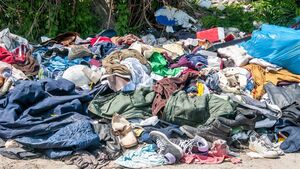Illegal dumping is a 'curse' in Mayo town

A bigger problem of illegal dumping at Glasco banks is a “curse,” said Mr Farrelly, who notes that surging volumes of low-quality clothing is being abandoned at bottle banks.
Vandalism to bottle banks in Ballyhaunis forced the company operating the receptacles to take the green glass bank out of service for repair recently.
“There have been a couple of incidents this year,” said David Farrelly, general manager at Glasco, part of the Rehab group, adding that major increases in disposal of clothing is causing an issue at bottle banks. “One of our green banks has been decommissioned until we can figure out what happened to it and repair it,” he said.
Overall, however, such incidents happen “very occasionally”, said Farrelly, whose company operates glass and can collection points at sites run by 25 local authorities nationwide.
A bigger problem of illegal dumping at Glasco banks is a “curse,” said Mr Farrelly, who notes that surging volumes of low-quality clothing is being abandoned at bottle banks.
The problem is set to deepen as the clothing or textile recycling market is “going through upheaval,” explained Mr Farrelly. Under EU circular economy regulations that came into force in January, local authorities are required to collect textiles for recycling. This is partly an effort to deal with surging amounts of cheap, low-quality clothing - much of it from fast fashion chains and from Chinese e-commerce channels like Temu - entering the waste system.
Volumes of glass and aluminium cans have dropped since peaking during Covid when at-home drinking drove up the numbers of bottles and cans being deposited. The introduction of a deposit return scheme at retail outlets, meanwhile, has shrunk the volumes of aluminium cans being deposited at Glasco sites, said Mr Farrelly.
“We have seen a drop of up to 80% in aluminium cans being deposited, and we are seeing more food cans which are made of steel. Aluminium is a more valuable product to recycle.”
Mr Farrelly explained that glass remains sought after as it’s cheaper to make bottles and jars from recycled material due to the reduced need for expensive furnaces required to make new glass bottles and jars.
Local authorities are hoping, meanwhile, that a recycling company like Glasco will step forward to collect textiles for them in much the way that Glasco collects glass and cans. In the meantime, overflowing clothes banks adjacent to bottle banks draw dumpers of general household waste, explained Mr Farrelly. Irish law prevents firms like Glasco from using footage from CCTV cameras at their collection sites.
Mr Farrelly says there is a “huge amount” of textile material exiting Irish homes, with local authorities tendering for textile collection services. The situation, he added, is being exacerbated by traditional outlets for Irish used textile exports like Ukraine being gripped by war while shipments to key markets like Ghana have been made prohibitively expensive by the Houthi attacks on the Suez Canal, forcing ships to go a longer route that makes cargo more expensive.
Mayo TD Alan Dillon, who is the junior minister at the Department of Enterprise, Trade and Employment, told the Dáil recently that his office is aware “local authorities and charity shops report that used textile collection is under much strain” due to “adverse international collection and trading conditions".




